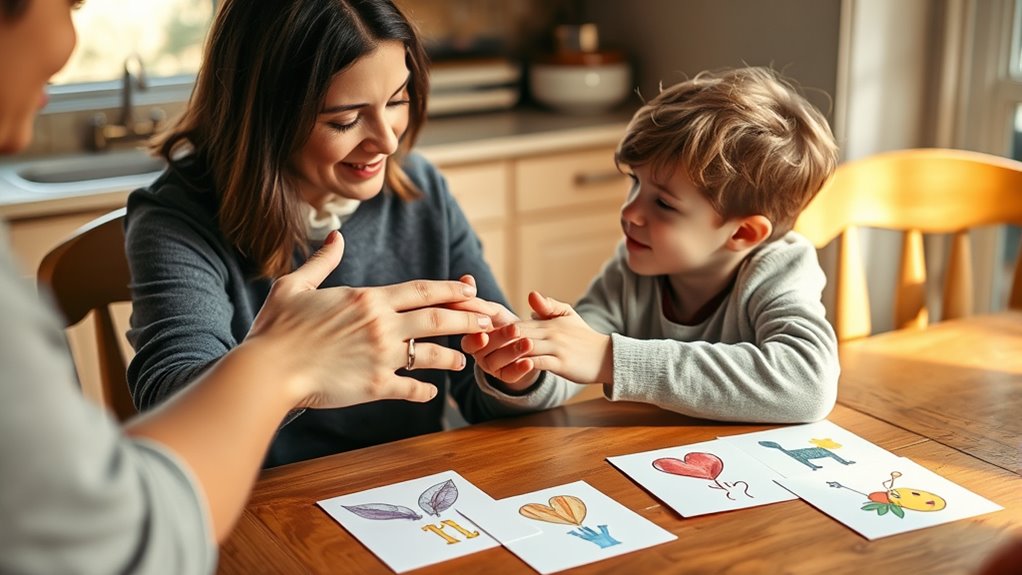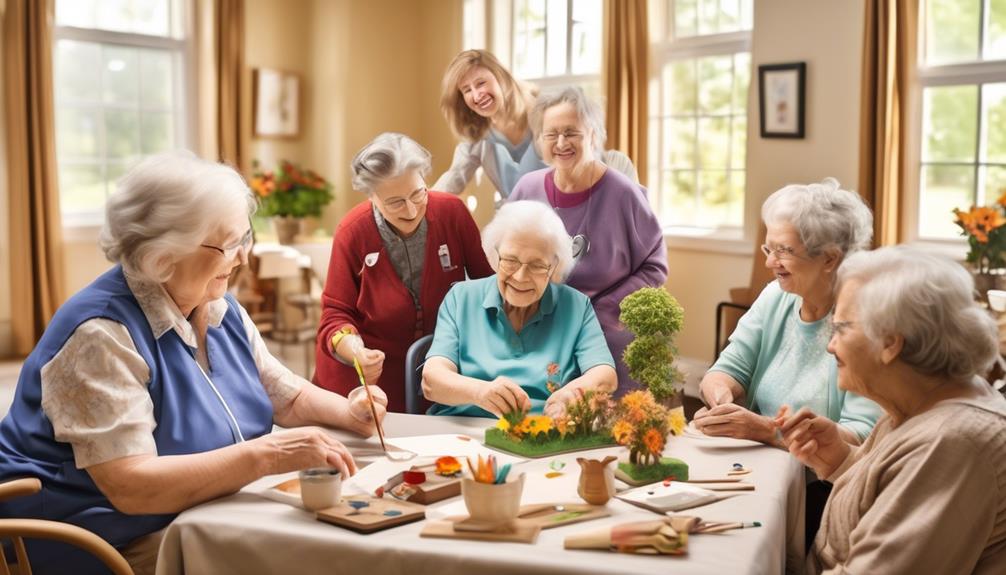Communicating with a loved one who has aphasia can be challenging, but patience and creativity make a big difference. Use simple gestures like pointing, nodding, or hand signals to clarify your message, and pair them with warm words. Offer emotional support by reassuring them and maintaining eye contact. Encourage alternative expressions such as drawing or singing, and stay calm to reduce frustration. To discover more helpful strategies and build stronger connections, keep exploring ways to support your loved one.
Key Takeaways
- Use simple gestures, facial expressions, and non-verbal cues to enhance understanding.
- Practice patience, empathy, and create a calm environment to support emotional well-being.
- Encourage alternative communication methods like drawing, writing, or singing.
- Reassure your loved one with comforting words and maintain eye contact to foster trust.
- Focus on emotional connection and shared moments beyond words to strengthen your bond.

When someone you love has aphasia, communicating can become challenging and frustrating for both of you. You might find it difficult to understand their words or to express your own thoughts clearly. During these moments, adopting gesture strategies can be incredibly helpful. Simple gestures like pointing, nodding, or using hand signals can bridge the gap when words fail. For example, if your loved one wants a glass of water, a pointing gesture combined with a smile can make the message clear. These non-verbal cues reinforce understanding and reduce frustration on both sides. Remember, patience is key—your calmness and willingness to adapt show that you’re committed to staying connected, even when language isn’t reliable. Additionally, understanding Glycolic Acid’s role in scalp care can remind us that just as skincare products need proper application, effective communication requires patience and the right strategies. Offering emotional support is just as essential as using gesture strategies. When communication breaks down, your loved one might feel isolated, embarrassed, or frustrated. Your reassurance can make a significant difference. Use comforting words and gentle gestures to remind them that you’re there for them, no matter what. Simple phrases like “I’m here” or “We’ll figure this out together” can provide a sense of stability and safety. Maintaining eye contact and a warm tone of voice also reinforce your support. Recognize that emotional reactions are natural, and your understanding helps your loved one feel accepted and cared for during difficult conversations. It’s important to validate their feelings and avoid showing impatience or irritation, which can intensify their frustration.
Using simple gestures like pointing and nodding can strengthen understanding when words fail.
Being attentive to their emotional state helps you respond more effectively. Sometimes, humor or distraction can lighten the mood if conversations become too tense. Encouraging your loved one to express themselves through drawing, singing, or writing can also be empowering and give them alternative ways to communicate. Remember, your role isn’t just about exchanging words but fostering emotional connection and trust. By combining gesture strategies with genuine emotional support, you create a safe environment where your loved one feels valued and understood. This approach not only improves communication but also nurtures their confidence and emotional well-being.
Ultimately, steering through communication with a loved one who has aphasia requires patience, empathy, and creativity. Your willingness to adapt, support, and understand can make a profound difference in their daily life. Small gestures, heartfelt words, and consistent emotional support help bridge the communication gap, making your shared moments meaningful despite the challenges. Keep in mind that your presence and understanding matter more than perfect conversations. Through these efforts, you strengthen your bond and help your loved one feel loved and accepted, no matter what language hurdles they face.
Frequently Asked Questions
How Can I Tell if My Loved One Understands Me?
You can tell if your loved one understands you by paying attention to non-verbal cues like facial expressions, gestures, or nodding. Use patience strategies, giving them time to process and respond without pressure. If they seem engaged, maintain eye contact, and their reactions align with your words, they likely understand. Remember, understanding may take longer, so stay patient and supportive to strengthen your communication.
Are There Specific Apps to Aid Communication With Aphasia?
Imagine your loved one wielding a tiny, high-tech megaphone—yes, communication apps are like that. There are specific apps designed for aphasia, making speech therapy more accessible and engaging. These apps often feature picture-based communication tools or simplified language prompts, helping your loved one express themselves better. So, look into options like Proloquo2go or Lingraphica—they’re like digital speech therapists at your fingertips.
How Do I Handle Frustration During Conversations?
To handle frustration during conversations, practice patience building and remind yourself that progress takes time. Use deep breaths to stay calm, and offer emotional support to your loved one. Focus on their efforts, celebrate small successes, and avoid rushing. Remember, your calm demeanor reassures them and helps both of you feel more connected. Over time, your patience will strengthen your bond and improve communication.
What Daily Activities Can Improve Communication Skills?
You can improve communication skills daily by practicing gesture strategies and engaging in speech therapy exercises. Incorporate simple gestures like pointing or nodding to support understanding. Use clear, concise sentences and repeat key words. Dedicate a few minutes each day to speech therapy activities, such as naming objects or practicing conversational phrases. Consistent practice helps strengthen your loved one’s communication abilities and boosts their confidence over time.
How Can I Support Their Emotional Well-Being?
Did you know that emotional support can considerably boost recovery? You can support your loved one’s emotional well-being by offering encouragement strategies like listening patiently, celebrating small victories, and maintaining a positive attitude. Show empathy and reassurance daily, reminding them they’re loved and valued. Your consistent support helps reduce frustration, builds confidence, and fosters hope, making their journey easier and more hopeful.
Conclusion
Remember, patience and understanding are your best tools, even when it feels like exploring a labyrinth. Use simple words, gestures, and listen carefully—your loved one values your presence more than perfection. Think of it as your own personal Rosetta Stone, revealing new ways to connect. Though it may seem like a Herculean task at times, your unwavering support can make all the difference. Keep the faith; love always finds a way, even in the most unexpected of times.









